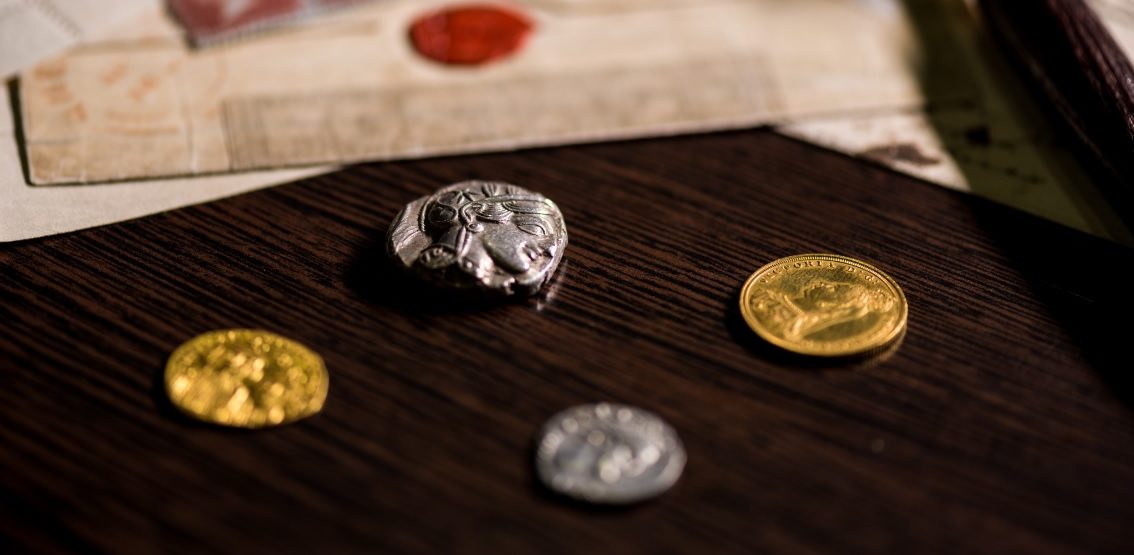Building a coin collection is a rewarding and accessible way to own a piece of history. All coin collectors, regardless of age, preferences and experience, are a part of a long line of connoisseurs fascinated by coins’ beauty and rarity, as well as political, historical and societal significance. Certain coins can be on par with masterpieces of Classical Antiquity and Renaissance; yet, unlike monumental sculpture and painting, coins are much more accessible to collectors. Throughout history, it was customary to present coins as gifts or good luck charms on special occasions, a tradition lasting to the present day.
When collecting and studying coins, you will notice the iconographical trends and how the earliest of coins influenced the currency we handle today. The now-standardized depictions of deities, personifications and rulers were, for the most part, conceived in antiquity. Throughout the past, the coins helped disseminate political messages across vast geographical distances. The coins of the Roman Empire are a great example, as they communicated military conquests, dynastic changes and even architectural feats to all citizens of the Empire.
Numismatic collections can be formed based on preferences towards historical periods, personalities depicted, mythology, natural history or politics. Every coin collection is very personal and has a unique meaning to each collector. When starting to collect coins, it is important to consider a few points, below.
Find a reputable expert dealer to advise you. A numismatic expert will be able to advise you on your purchases and offer a range of services to best maintain and grow your collection. In the numismatic world, trust and reputation built over time are crucial. London is the perfect place to find an expert dealer that has been in the trade for decades. Find out if your dealer belongs to an internationally acclaimed trade association, as this means a higher level of customer care and due diligence will be expected of them. For numismatics, the relevant associations aside from LAPADA are: International Association of Professional Numismatists (IAPN), British Numismatic Trade Association (BNTA) in the UK and American Numismatic Association (ANA) for dealers that do business in the USA. The websites of these organizations will provide you with trustworthy members.
Guarantee of authenticity. If you are starting a coin collection, a reputable dealer will guarantee authenticity of the items they sell. Upon request, for your reassurance or in case of a gift purchase, they should be able to provide a certificate of authenticity for the item. The certificate should include discerning qualities of the item: description, type of metal, reference, weight and provenance, if available. This is an additional layer of safety that will help should you ever decide to sell your collection or simply keep it for your records.
Pay attention to the condition. When building a coin collection, condition is one of the most important features that will determine the value of your item. Make sure to ask the expert about any potential repairs, cleaning, traces of mounting, scratches or residues on the item. This is particularly relevant if you are buying online. Gold is durable; however, being a soft metal, it is susceptible to scratches. Silver can acquire a beautiful tone over time; however, it needs to be kept away from acids. Bronze items can develop attractive green patina over time and sometimes bronze disease: this will show up as light green specs on your coins. If you notice any changes, it is important to act immediately: separate the affected coins and contact an expert who will treat the coin to prevent further damage.
Handling coins and taking care of your collection. It must be noted that coins are antique items, some of them irreplaceable in their beauty and rarity. As with any antique, you must take care to avoid exposure to drastic changes in temperature, humidity or light. It is not advisable to clean your coins on your own initiative: always consult an expert. The patina and toning will often add to the value and the aesthetic appeal of the coin.
The best way to keep your coins is to lay them flat in a lined coin tray, inside a coin cabinet. A beautiful, antique, hardwood coin cabinet is a lovely storage solution for a coin collection. If you are transporting your coins, plastic packets will suffice for short-term use – be mindful not leave your coins in plastic for years. You may also use acid-free paper coin envelopes for transport. Make sure to minimize handling coins with your hands and use protective gloves for frequent handling. Finally, always pick up a coin by its edge, rather than its face, so as to avoid leaving fingerprints on its surfaces.

